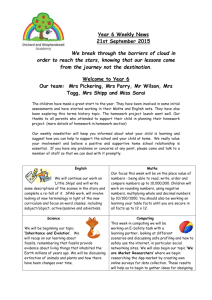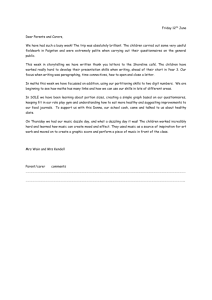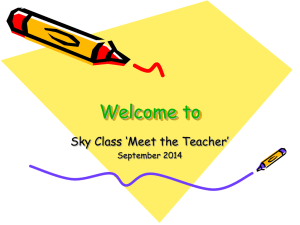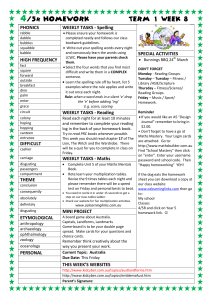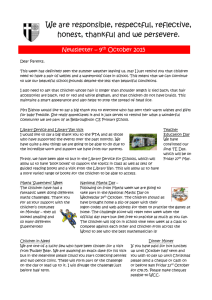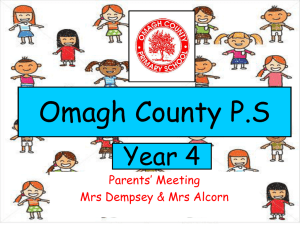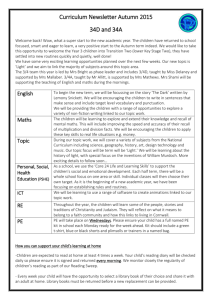Year-2-Parents-meeting-pp Presentation
advertisement
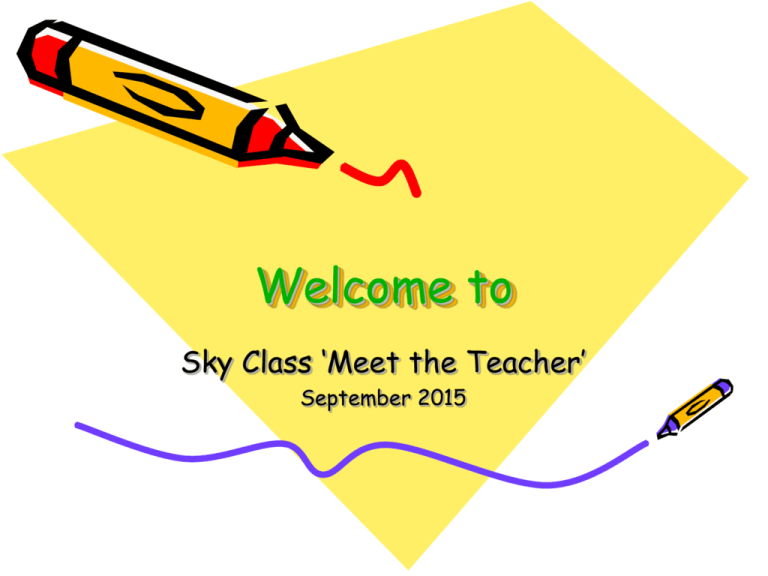
Welcome to Sky Class ‘Meet the Teacher’ September 2015 What happens in Sky class ? • Children have a daily English and Maths lesson. They are sat in groups for these lessons according to their ability. This means that the work can be differentiated to the need of each group. Often children are mixed up to work in mixed ability or friendship groups. • Once a week the children have an ICT, Circle Time lesson, music lesson and R.E lesson. Twice a week . there is a science lesson. The I pads are used on a daily basis to support teaching and learning. • Three times a week the children have a topic lesson which is when history, geography, art and other cross curricular lessons are taught. • Children have a phonics session in a differentiated group on a daily basis. • Children have regular guided reading sessions. This is timetabled according to their group and they read with the teacher or TA. If they are not reading that day then they carry out another related activity such as comprehension, personalised learning, handwriting, writing journal or .I pad activities. Sky Class • I encourage the children to take more responsibility for their own learning and they are encouraged to work independently and co-operatively in groups throughout the week. • In year 2 the children have the chance to support the adult in school with monitor jobs. These are on a weekly rota basis. • The children use ICT and the outdoor environment where possible to support their learning. • The children develop their self-confidence as they take larger parts in the school Christmas play and in assemblies. Monitoring Progress • At the end of year 2 the children will be assessed in reading, writing, maths and science. These levels are reported to the county and are used to measure the success of the school. • Each child is informally assessed daily through independent and guided work, conversation and marking. At points throughout the year the children are more formally assessed as part of an assessment week and this supports my planning to see what the next steps are in learning. Age related expectations • The government have brought in a more individualised system of assessment using the terms ‘working towards’ ‘expected’ and ‘mastered’ • Levels have been replaced – so 2b is no longer the expected standard. • They have set out what an expected child should achieve by the end of each year group. • Last year you will have been informed of your child’s level in the end of year report. This year we will equate the level to the new requirements which will be assessed termly. Maths • In Year 2 the children have a weekly mental maths test. • From October will have a weekly times table test from the scheme ‘Cracking Times Tables.’ This scheme works in levels depending on the time table that has been passed. It starts on x2, then x5, x10 moving onto the other tables. Maths In year 2 the targets for an expected child are to: • partition two-digit numbers into different combinations of tens and ones. • add 2 two-digit numbers within 100 (e.g. 48 + 35) and can demonstrate their method using concrete apparatus or pictorial representations. • use estimation to check that their answers to a calculation are reasonable • subtract mentally a two-digit number from another two-digit number • recognise the inverse relationships between addition and subtraction and use this to check calculations and work out missing number problems (e.g. ∆ − 14 = 28). • recall and use multiplication and division facts for the 2, 5 and 10 multiplication tables to solve simple problems identify 1/3 , 1 /4 , 1/2 , 2 /4 , 3 /4 and know that all parts must be equal parts of the whole Maths • use different coins to make the same amount • read scales in divisions of ones, twos, fives and tens in a practical situation where all numbers on the scale are given • read the time on the clock to the nearest 15 minutes. • describe properties of 2-D and 3-D shapes Writing • In Sky class the children have a weekly extended writing session called Big Write. • I encourage the children to extend their writing skills and each child has their own targets to try to achieve in the lesson. At the end of each lesson the child assess their own work and think about their next steps. Writing In year 2 the targets for an expected child are to: • write a narrative about their own and others’ experiences (real and fictional) • demarcate most sentences with capital letters and full stops and with some use of question marks and exclamation marks • use sentences with different forms in their writing (statements, questions, exclamations and commands) • use some expanded noun phrases to describe and specify • use present and past tense mostly correctly and consistently • use co-ordination (or / and / but) and some subordination (when / if / that / because) • segment spoken words into phonemes and representing these by graphemes, spelling many correctly • spell many common exception words • spell some words with contracted forms • add suffixes to spell some words correctly in their writing e.g. –ment, –ness, –ful, –less, –ly Handwriting In year 2 the targets for an expected child are to: • use the diagonal and horizontal strokes needed to join letters in some of their writing • write capital letters and digits of the correct size, orientation and relationship to one another and to lower case letters • use spacing between words that reflects the size of the letters. Licence to Quill is awarded to children who consistently show a regular, joined and neat cursive style in their work. Reading Books • Children have all been given an appropriate level reading book. • In Sky class the children take responsibility for changing their own books. They place them in the reading basket to show that they need changing. Then the new book is recorded in the reading folder. • I am happy to change books daily as appropriate according to the level. • Please ensure that reading record books are in school everyday, then guided reading sessions can be recorded. Reading In year 2 the targets for an expected child are to: • accurately most words of two or more syllables • read most words containing common suffixes • read most common exception words In age-appropriate books: • read words accurately and fluently without overt sounding and blending, e.g. at over 90 words per minute • sound out most unfamiliar words accurately, without undue hesitation. • check it makes sense to them • answer questions and make some inferences on the basis of what is being said and done Science •The science curriculum in year 2 is taught in half termly units. They are called: Plants Using electricity Uses of everyday materials Animals, including humans Living things and their habitats • The children use first hand experience through investigation to record and make conclusions. Science curriculum In year 2 the targets for an expected child are to: • ask their own questions about what they notice • use different types of scientific enquiry to gather and record data, using simple equipment where appropriate, to answer questions • finding things out using secondary sources of information • use appropriate scientific language from the national curriculum to communicate their ideas in a variety of ways, what they do and what they find out. Science curriculum • name and locate parts of the human body, including those related to the senses, and describe the importance of exercise, balanced diet and hygiene for humans • describe the basic needs of animals for survival and the main changes as young animals, including humans, grow into adults • describe basic needs of plants for survival and the impact of changing these and the main changes as seeds and bulbs grow into mature plants • identify whether things are alive, dead or have never lived • describe and compare the observable features of animals from a range of groups • group animals according to what they eat, describe how animals get their food from other animals and/or from plants, and use simple food chains to describe these relationships • describe seasonal changes • name different plants and animals and describe how they are suited to different habitats • use their knowledge and understanding of the properties of materials, to distinguish objects from materials, identify and group everyday materials, and compare their suitability for different uses. Topic • Each half term the children will learn about a cross • • • curricular topic. Each topic will have a focus of subjects such as DT, art, history or geography. We will also make links to literacy, numeracy and ICT. You will find a topic web showing each half term’s objectives on the year 2 page of the school website. At the start of each topic the children will have an exciting WOW day to stimulate their interest in the topic. Each half term the children will have a trip linked to their topic. Personal, Social and Emotional Development • Each week the children have a themed circle time where we play games to develop self – confidence, encourage team work and build friendships. • The circle time also involves discussing a topic and giving the children chance to share their thoughts and ideas for dealing with issues or problems. P.E • Each week the children have a tennis lesson with Haddenham Tennis Club and a P.E session with a specialist P.E teacher that covers either dance, gym or games. • Please ensure that all kit is named and warm clothes are provided for the winter months. • P.E kit must be kept in school, so that it is available every day. . Music • The children have a weekly music lesson with Mrs Law where they practice singing, compositional and listening skills. • They are also beginning to learn to play the recorder. Uniform • Please ensure that your child’s name is in all items of clothing, including shoes! • Please can children have a coat and please provide wellies. In sky class we still continue to learn outdoors where possible. Homework • Children receive a piece of English or maths homework on a sheet on a weekly basis. It goes out on a Monday. • Learning logs for the term are published on the year 2 part of the website. How you can find out how your child is getting on? It is important that parents and the staff work together. We want you to feel comfortable about exchanging information and discussing things that will benefit your child. We have Parent’s Evening in November and March. We also send an Interim Report out in February. Please don’t feel that this is the only time you can come in and talk to us. You can make an appointment to suit you to come in for a chat or you can catch the teachers in the playground before or after school. Parent helpers If you are interested in coming into school to support with sharpening, reading or jobs in the class then please speak to Mrs Richardson. Please remember…. If you have any concerns or questions, we will be happy to help you. Mrs Richardson-Sky class teacher Mrs Butler-TA– Wed, Thurs and Fri Mr Beattie and Mrs Brown – student teachers Any questions?
